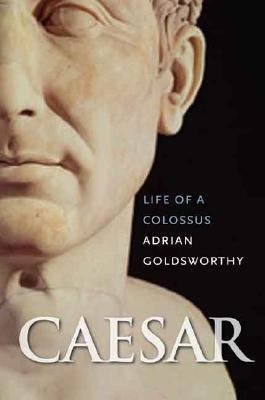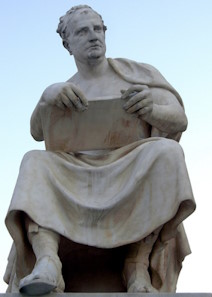Roman History

Caesar: Life of a Colossus (2006) by Adrian Goldsworthy. There’s a reason that Caesar’s life has been so frequently remembered over 2000 years later, and it’s not because he invented the Caesar Salad (he didn’t, although he did create the Julian Calendar, which is almost identical to the one we use today). The story of Gauis Julius Caesar has been retold so many times because it’s so incredible. Caesar wasn’t just incredibly talented – although he was – he was also one of the luckiest humans to ever live. Determined to achieve, despite odds stacked against him, he just kept rolling the dice … taking incredible chances … and kept rolling aces. And so he “crossed the Rubicon”, fought and defeated the armies of his enemies, and was the first to take control of the whole Roman Empire.
So why did he then dismiss his personal guards and walk alone into the Senate chamber, knowing for a fact he had enemies who wanted him dead, (he had pissed off practically everyone else in power by refusing to share it), and even his wife knew it and begged him not to go? I don’t think he had a death wish. My theory is that after gambling so long, on often, on such long odds, and winning every time, he made the fatal mistake: he started to believe his own propaganda. He had long claimed that his family were direct decedents of the goddess Venus, and the gods themselves were watching over him. This story convinced more and more people to throw caution to the wind and follow him – especially as he kept winning. I think after telling the story so often, and rolling the dice so often, and coming up aces every time, he finally believed that the gods really were protecting him. It’s a cautionary tale: never believe your own propaganda. Anyway, sorry for the spoilers, but I take it for granted that while people may not know how Caesar lived, everyone knows how he ended. It’s a story everyone should know and Goldsworthy tells it as well as anyone I have seen.

The ancient History of Rome by Titus Livy is a very entertaining read, even if the historical accuracy of some of it is dubious. Only about a quarter of the entire work still survives, but that is still quite a bit. Books 1 through 10 cover the first few hundred years of Rome, starting from it’s founding by Romulus and Remus. Books 21 through 30 cover the war with Hannibal of Carthage, who brought elephants in full battle gear across the Alps to invade Rome. Another 25 books are also complete or mostly so. Nearly all of it describes some pretty wild events. The governing structure of the Roman Republic is so strange it’s hard to believe it worked as well as it did… And sometimes it didn’t, at which point they would appoint a Dictator temporarily who was authorized to break the rules. One one occasion, a Dictator was appointed simply to hammer in a nail. Honorably, he resigned his office immediately upon completion of this task.